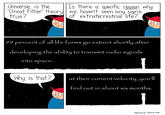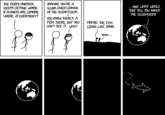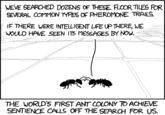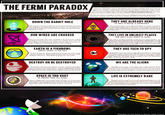Fermi Paradox
Part of a series on Space. [View Related Entries]
| Navigation |
| About • Origin • Spread • Search Interest • External References • Recent Images • Recent Videos |
About
The Fermi Paradox refers to the conflict between the high statistical probability of intelligent extraterrestrial life in the universe and the failure of humans to find evidence of their existence. Many hypothetical explanations for the paradox have been proposed, including speculation that humans may be the first and only intelligent life in the universe, that space is too vast for extraterrestrials to traverse or that intelligent civilizations are destroyed prior to leaving their home world.
Origin
In 1950, the physicist Enrico Fermi famously questioned why humanity had failed to document any evidence of extraterrestrial civilizations if a multitude were likely to exist within the galaxy. In 1975, astrophysicist Michael H. Hart published a paper titled "Explanation for the Absence of Extraterrestrials on Earth," which provided an in-depth examination of the paradox.[6]
Drake Equation
In 1961, astrophysicist Frank Drake wrote an equation to estimate the probability of active extraterrestrial civilizations within the Milky Way galaxy. Due to a number of uncertainties, Drake estimated that there were likely between 1,000 and 100,000,000 intelligent civilizations in the Milky Way alone.
Spread
On September 18th, 2009, Xkcd[7] published a comic titled "The Search," in which a sentient ant colony calls off the search for intelligent life after failing to discover other pheromone trails (shown below).

On November 27th, 2012, a page for the Fermi paradox was created on TV Tropes.[2] On March 20th, 2013, the sci-fi blog io9[5] published a listicle titled "11 of the Weirdest Solutions to the Fermi Paradox." In May 2014, the educational blog Wait But Why[3] published an article on the Fermi paradox. On June 4th, Xkcd[8] posted a comic titled "Fish," which speculated that humans have yet to find evidence of extraterrestrials because they are invisible (shown below).

On April 25th, 2015, the astrophysics blog Quarks to Quasars[4] published an infographic containing various explanations for the Fermi paradox (shown below).

On May 6th, the In a Nutshell YouTube channel uploaded a video titled "The Fermi Paradox – Where Are All the Aliens?", which described the hypothetical Dyson sphere technology and provided various hypothetical explanations for the paradox (shown below, left). On June 4th, a second video was uploaded which included additional explanations for the Fermi paradox (shown below, right).
On September 17th, Edward Snowden was interviewed by Neil deGrasse Tyson on the StarTalk podcast, where he proposed that the Fermi paradox could be explained by encryption techniques used by extraterrestrial civilizations (shown below).
Search Interest
External References
[1] Wikipedia – Fermi Paradox
[2] TV Tropes – Fermi Paradox
[3] Wait But Why – The Fermi Paradox
[4] FromQuarkstoQuasars – Ten Solutions to the Fermi Paradox
[5] io9 – 11 of the Weirdest Solutions to the Fermi Paradox
[6] Harvard.edu – Explanation for the Absence of Extraterrestrials on Earth
[7] Xkcd – The Search












Comments ( 61 )
Sorry, but you must activate your account to post a comment.
Please check your email for your activation code.